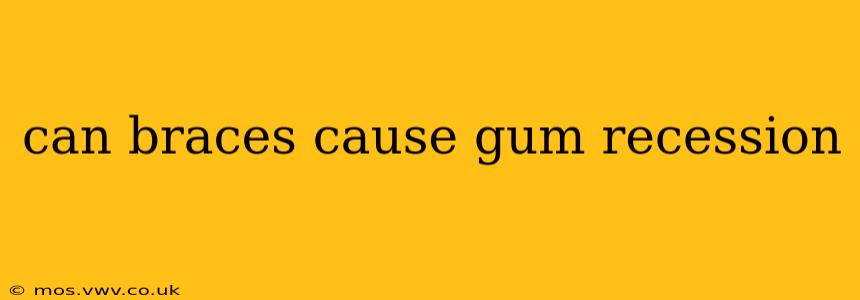Gum recession, the process where your gums pull back, exposing more of your teeth, is a concern for many orthodontic patients. While braces themselves don't directly cause gum recession, certain factors related to orthodontic treatment can increase the risk. Understanding these factors is crucial for maintaining optimal oral health during and after your treatment.
What is Gum Recession?
Before diving into the relationship between braces and gum recession, let's define the condition itself. Gum recession occurs when the gum tissue that surrounds your teeth pulls back, exposing the tooth roots. This can lead to several problems, including increased sensitivity, tooth decay, and even tooth loss. Several factors contribute to gum recession, including genetics, aggressive brushing, periodontal disease, and, in some cases, orthodontic treatment.
Can Braces Directly Cause Gum Recession?
No, braces themselves do not directly cause gum recession. The metal brackets and wires don't directly damage the gums. However, certain aspects of orthodontic treatment can indirectly contribute to gum recession if not properly managed.
How Can Braces Indirectly Contribute to Gum Recession?
Several factors associated with orthodontic treatment can increase the risk of gum recession:
1. Poor Oral Hygiene:
This is perhaps the biggest culprit. Braces create more nooks and crannies where food particles and plaque can accumulate. If not diligently cleaned, this plaque can lead to gingivitis (gum inflammation) and periodontitis (gum disease), both of which are major contributors to gum recession.
2. Irritation from Brackets and Wires:
The brackets and wires of braces can sometimes irritate the gums, causing inflammation and potentially leading to recession if the irritation is prolonged or severe. This is more likely if the braces are not properly adjusted or if there's an ill-fitting appliance.
3. Excessive Force from Orthodontic Appliances:
While orthodontists carefully plan the movement of teeth, excessive force applied by braces can, in rare cases, damage the supporting tissues around the teeth, contributing to gum recession. This is less common with modern orthodontic techniques and skilled orthodontists.
4. Pre-existing Gum Disease:
Individuals who already have gum disease before starting orthodontic treatment are at a significantly higher risk of experiencing gum recession during treatment. Addressing any pre-existing gum problems is crucial before starting braces.
How Can I Prevent Gum Recession While Wearing Braces?
Preventing gum recession during orthodontic treatment requires diligent attention to oral hygiene:
- Meticulous Brushing: Brush your teeth thoroughly and gently at least twice a day, using a soft-bristled toothbrush and fluoride toothpaste. Pay close attention to the areas around the brackets and wires.
- Flossing: Flossing is essential to remove food particles and plaque from between the teeth and under the wires. Consider using interdental brushes or floss threaders for easier access.
- Using a Mouthwash: Therapeutic mouthwash can help reduce plaque and bacteria. Your orthodontist can recommend a suitable mouthwash.
- Regular Orthodontic Check-ups: Attending all scheduled appointments with your orthodontist is vital to ensure the braces are functioning correctly and to address any potential issues promptly.
- Professional Cleanings: Schedule regular professional cleanings with your dentist or hygienist to remove plaque and tartar buildup that you may miss during home care.
What Should I Do if I Notice Gum Recession?
If you notice any signs of gum recession, such as bleeding gums, sensitive teeth, or exposed tooth roots, contact your orthodontist or dentist immediately. Early intervention is crucial to prevent further recession and potential complications.
Can Gum Recession be Reversed?
In some cases, minor gum recession can be reversed or improved through procedures like gum grafting. However, it's important to prevent further recession rather than relying on reversal techniques.
By maintaining excellent oral hygiene and working closely with your orthodontic and dental team, you can significantly reduce your risk of gum recession during and after orthodontic treatment. Remember, proactive care is key to a healthy smile.
